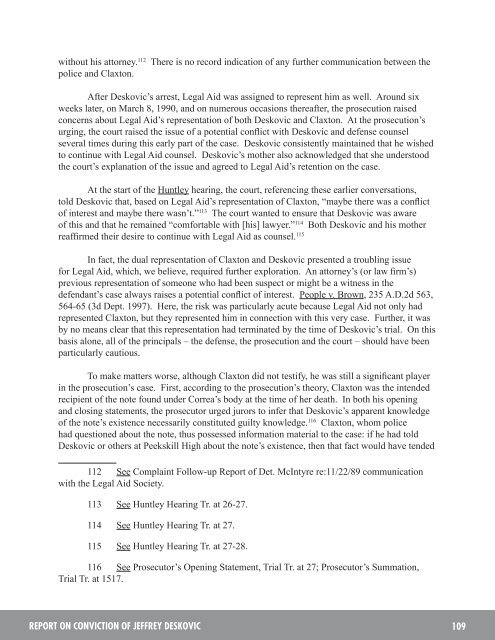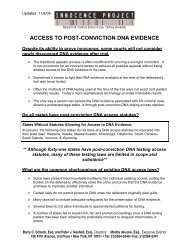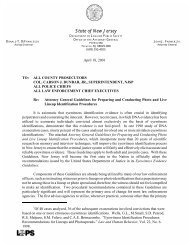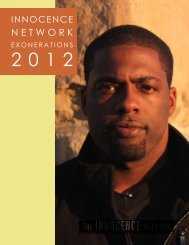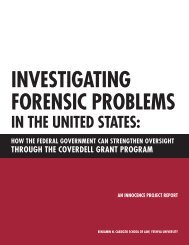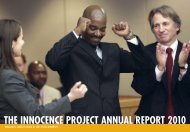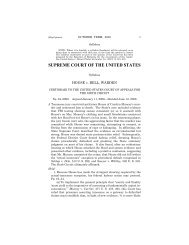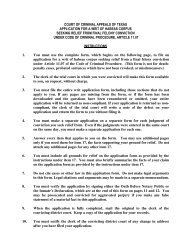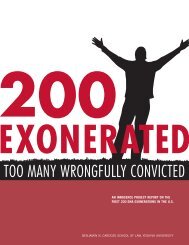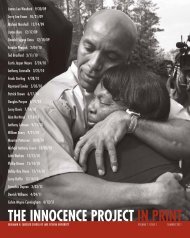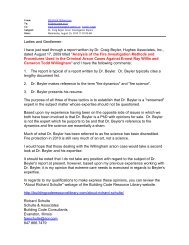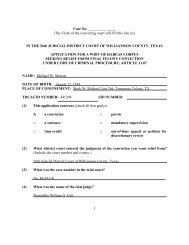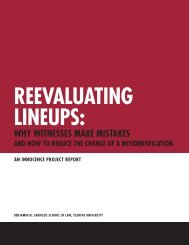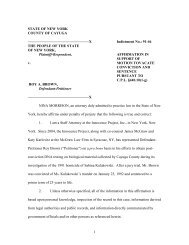Lessons Not Learned - The Innocence Project
Lessons Not Learned - The Innocence Project
Lessons Not Learned - The Innocence Project
You also want an ePaper? Increase the reach of your titles
YUMPU automatically turns print PDFs into web optimized ePapers that Google loves.
without his attorney. 112 <strong>The</strong>re is no record indication of any further communication between the<br />
police and Claxton.<br />
After Deskovic’s arrest, Legal Aid was assigned to represent him as well. Around six<br />
weeks later, on March 8, 1990, and on numerous occasions thereafter, the prosecution raised<br />
concerns about Legal Aid’s representation of both Deskovic and Claxton. At the prosecution’s<br />
urging, the court raised the issue of a potential conflict with Deskovic and defense counsel<br />
several times during this early part of the case. Deskovic consistently maintained that he wished<br />
to continue with Legal Aid counsel. Deskovic’s mother also acknowledged that she understood<br />
the court’s explanation of the issue and agreed to Legal Aid’s retention on the case.<br />
At the start of the Huntley hearing, the court, referencing these earlier conversations,<br />
told Deskovic that, based on Legal Aid’s representation of Claxton, “maybe there was a conflict<br />
of interest and maybe there wasn’t.” 113 <strong>The</strong> court wanted to ensure that Deskovic was aware<br />
of this and that he remained “comfortable with [his] lawyer.” 114 Both Deskovic and his mother<br />
reaffirmed their desire to continue with Legal Aid as counsel. 115<br />
In fact, the dual representation of Claxton and Deskovic presented a troubling issue<br />
for Legal Aid, which, we believe, required further exploration. An attorney’s (or law firm’s)<br />
previous representation of someone who had been suspect or might be a witness in the<br />
defendant’s case always raises a potential conflict of interest. People v. Brown, 235 A.D.2d 563,<br />
564-65 (3d Dept. 1997). Here, the risk was particularly acute because Legal Aid not only had<br />
represented Claxton, but they represented him in connection with this very case. Further, it was<br />
by no means clear that this representation had terminated by the time of Deskovic’s trial. On this<br />
basis alone, all of the principals – the defense, the prosecution and the court – should have been<br />
particularly cautious.<br />
To make matters worse, although Claxton did not testify, he was still a significant player<br />
in the prosecution’s case. First, according to the prosecution’s theory, Claxton was the intended<br />
recipient of the note found under Correa’s body at the time of her death. In both his opening<br />
and closing statements, the prosecutor urged jurors to infer that Deskovic’s apparent knowledge<br />
of the note’s existence necessarily constituted guilty knowledge. 116 Claxton, whom police<br />
had questioned about the note, thus possessed information material to the case: if he had told<br />
Deskovic or others at Peekskill High about the note’s existence, then that fact would have tended<br />
112 See Complaint Follow-up Report of Det. McIntyre re:11/22/89 communication<br />
with the Legal Aid Society.<br />
113 See Huntley Hearing Tr. at 26-27.<br />
114 See Huntley Hearing Tr. at 27.<br />
115 See Huntley Hearing Tr. at 27-28.<br />
116 See Prosecutor’s Opening Statement, Trial Tr. at 27; Prosecutor’s Summation,<br />
Trial Tr. at 1517.<br />
RePoRT on ConVICTIon oF JeFFReY DesKoVIC<br />
109


